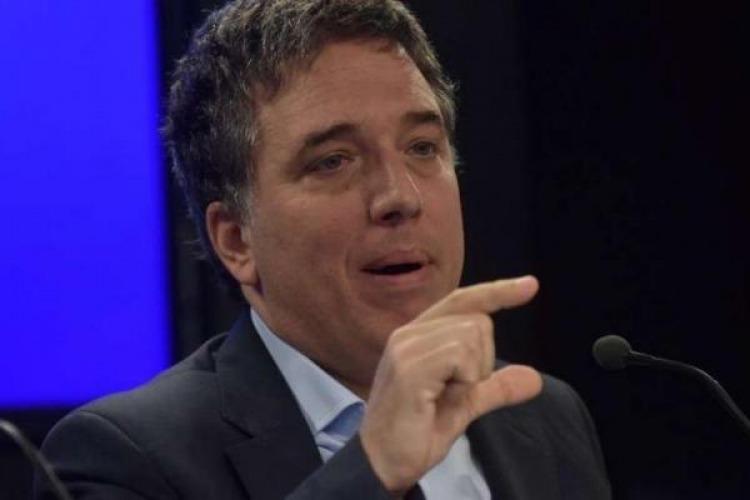Latin America
Related: About this forumEchoing 2001 crisis, Argentina's Macri appoints "superminister"
Following a turbulent month in local markets, Argentine President Mauricio Macri ordered the promotion of Economy Minister Nicolás Dujovne to a “superminister” with coordinating powers over nine of the nation's 20 cabinet ministries.
The move comes after a run on the peso forced the central bank to sell off $7.7 billion from its reserves from April 23 to May 15, during which the peso nevertheless tumbled from 20 to 25 to the dollar.
While the peso has since stabilized, the panic forced Argentina's Central Bank to raise its discount rate from 27% to 40%, borrow $2 billion from the Bank for International Settlements, $2 billion from the New York-based vulture fund BlackRock, as well as request a stand-by credit line from the IMF for a whopping $30 billion.
Dujovne, 51, is media-savvy but controversial. He became one of several Macri officials listed in a tax “whitewash” scandal when it was revealed in April that he had obtained amnesty in 2016 for $1.3 million in undeclared income kept offshore.
His promotion is also seen as a signal to U.S. President Donald Trump, whose son Eric hired the minister's father, architect Berardo Dujovne, in 2012 to design Trump Tower Punta del Este, a luxury condominium building in neighboring Uruguay.
Deficit hawk
Dujovne has nevertheless moved quickly to reduce record fiscal deficits by cancelling further tax cuts to the influential soy export sector. Further cuts to subsidies and public works have also been announced.
Corporate tax cuts and rising interest payments on high-yield LEBAC notes have pushed budget deficits under Macri to a record $38 billion, while removing protectionist measures has doubled current account deficits to $31 billion.
The public debt has meanwhile grown by a third in two years, to $320 billion - of which over half is now foreign debt.
Opposition lawmakers have slammed the proposed austerity measures, noting that subsidy cuts have already led to utility hikes of up to 1700%. The lower house passed a bill on May 9 freezing utility rates at their December 2017 levels - legislation Macri has threatened to veto should it pass the senate.
Back to the future
The IMF stand-by and the naming of a superminister recall the country's 2001 crisis, after '90s era privatizer Domingo Cavallo was given the same title in an effort to calm markets.
Cavallo's appointment, as well as a $38 billion “bulletproof” IMF stand-by similar to the one now being sought, were instead interpreted as crisis moves, and by December 2001 Argentina defaulted on a then-record $83 billion in sovereign debt.
The economy later recovered under the populist Néstor and Cristina Kirchner administrations from 2003 to 2015, though growth sputtered after exchange controls were imposed in 2012 in an effort to curb current account deficits.
Cavallo, who is reportedly back as an informal adviser, criticized Macri last week for rescinding the exchange controls without first tackling inflation, currently running at 31% on an annualized basis.
At: https://translate.google.com/translate?sl=auto&tl=en&js=y&prev=_t&hl=en&ie=UTF-8&u=https%3A%2F%2Fwww.eltelegrafo.com.ec%2Fnoticias%2Fmundo%2F8%2Fargentina-nicolas-dujovne-ministro-ajuste-fmi&edit-text=
Macri's new “superminister” Nicolás Dujovne: In search of market confidence.
Judi Lynn
(160,555 posts)Any dissent from the struggling masses will be called a rebellion and they will send their death squads to lay waste to the ones who try to speak for their suffering families, neighbors, communities. They will bind the population in a fear-driven paralysis, keeping each man, woman living in fear for his/her life, suspecting everyone around them as possible enemies, and fortify their power by sending military figures to kidnap, torture, and murder any outspoken or suspected opposition figures.
They have already started imprisoning community leaders, and notorious disappearances followed by torture and murder. Can full dictatorship be far behind?
This IS the recognizable pattern set in place long ago. It has been done to death.

Brought back, Domingo Cavallo,
to catch anything he missed
destroying the first time.

"Further cuts to subsidies and public works have also been announced."
Macri helped this man steal legally by giving him amnesty, and together they conspire to steal from the needy, while stuffing their own pockets and those of their dirty consorts.
Thanks for the information, sandensea.
sandensea
(21,639 posts)You know, Cavallo (in 1989) wanted Pres. Alfonsín to leave office "spitting blood."
Not so much out of any personal animosity (although there was obviously some); but because Cavallo understood that a severe crisis would be the only way to privatize everything at fire sale prices - which, as you know, he later in fact did.
Karma being karma, Cavallo himself left office in 2001 in much the same way. Except that unlike Alfonsín, who was forced out by a market coup (the 1989 currency crisis), Cavallo really had no one to blame but himself.
Thanks as always for your research and insights, Judi.
Cavallo and a youthful Macri in the early '90s. Cavallo's a vocal supporter of his now, though Macri no doubt wishes he'd be a little less vocal about it.

